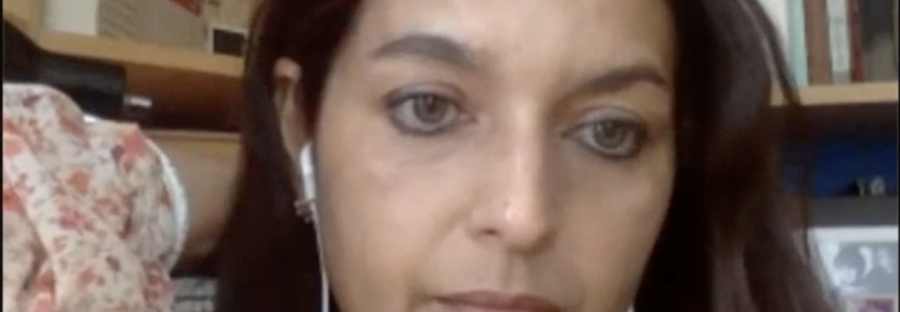Authors Jhumpa Lahiri and Kamila Shamsie discus Lahiri’s newest novel in one of the latest event that the Manchester Literature Festival have put on for this month.
- Manchester Literture Festival have been putting on digital events throughout this month
- Jhumpa Lahiri's recites extracts of her new novel and has a disccusion about key themes
- The director of the MLF explains why the festival is so important to the proud mancs and people all over the world
‘Whereabouts’, Jhumpa Lahiri‘s new novel is described by the Manchester Literature Festival as a “stunning new novel” about an “unnamed woman, in an unnamed Italian city” who is assessing her daily life after the unexpected death of her father.
This is the author’s first novel to be written in Italian and translated into English by herself.
The author was born in London, but in 2011 moved to Rome and has since been writing in Italian and translating other writer’s work from Italian to English.
Jhumpa has written four works of fiction that include: ‘Unaccustomed Earth’, ‘Interpreter of Maladies’ and ‘The Lowland’.
The ‘Lowland’ was shortlisted for both the Booker and Women’s Prize for Fiction.
During the conversation with novelist Kamila Shamsie, who is a patron of the MLF festival, themes such as solitude featured in the discussions.
The book itself revisits themes explored in previous works like ‘Interpreter of Melodies’ such as belonging and alienation.
Jhumpa Lahiri said: “As I re-read it (the novel), I thought that it’s a part of a collective conversation about a greater awareness of solitude, because I think we are all solitary creatures and we trick ourselves into thinking maybe we’re not.
When discussing the writing process, she said: “I started to write the book in 2015 but, in just a moment, I was drawn to how solitude can be declined, how solitude is always in conversation with others in some sense.
“It doesn’t exist in a vaccum.”
Just read Jhumpa Lahiri’s Whereabouts. A tale of muted sadness, of hope and despair, and of the drudgery of life, but what makes it special is the sense of foreboding that permeates through the pages.
— Kaushik Basu (@kaushikcbasu) May 25, 2021
“Disoriented, lost, at sea, at odds, astray, adrift, bewildered, confused, uprooted, turned around. I’m related to these related terms. These words are my abode, my only foothold…” Can’t seem to shake off Jhumpa Lahiri’s words. Whereabouts is so raw and beautiful ❤️
— Mohar Basu (@MoharBasu) May 24, 2021
The director of the MLF said: “ The Manchester Literature Festival is a celebration of imagination, ideas, stories, and voices from around the world and our program always features a broad mix of international, national, and local writers.
“Last year’s digital festival featured 11 international artists, including North American, Spanish and Palestinian writers.”
However, over the last 14 months, there have been many challenges for MLF due to the pandemic.
“Like most cultural organisations and venues, our main challenge has been finding ways to replace lost box office income due to the cancellation of live events”, an MLF representative said.
“The second biggest challenge was upskilling ourselves enough to research, curate, program, and deliver our first Digital Festival last October.
“It was a big learning curve but the fact we pulled it off shows our strength and resilience as a Festival team.”

The team is used to working in a small office where they can bounce ideas off each other and have space to explore, developing new projects.
However, they have adapted in lockdown to having regular Team meetings.
A number of benefits that a digital platform presents include being able to program more international authors from Jhumpa Lahiri, Kamila Shamsie, Tayari Jones, Brit Benett, Jericho Brown, Safiya Sinclair and Lola Shoneyin to activist Angela Davis without the prohibitive travel costs and environmental impact.
As well as being able to reach a wider geographic and demographic audience.
They said, “One of the wonders of Digital events is the opportunity to reach new audiences. We often have people traveling from other parts of the UK to visit Manchester Literature Festival, but 10% of our audience last year were based in the US.
We also had an international audience joining us from Argentina, Australia, Canada, China, Chile, India, Mexico, Nigeria, Pakistan, and Russia as well as Europe.”
However, according to MLF the biggest win long-term benefit of the pandemic is that more people are reading.
Explaining further, they said: “ I think the big increase in reading is one of the silver linings of the pandemic.
“I know some people have found it hard to concentrate but research by the Reading Agency and Nielsen Book found a lot of people turning to physical books, e-books and audiobooks during the pandemic.
“This is also reflected in book sales reports from most of the major publishers.”
Initially, there was a rush of people reading dystopian fiction and anything to do with epidemics but as months went by, people turned to the classics, crime, and fiction more.”
Currently, there are plans for the next festival to be held Friday 8 – Sunday 17 October 2021 and will be the first hybrid festival with both digital and in-person events.
MLF said: “The program will be smaller than usual but we are working closely with venues and partner organisations in the city to deliver our first in-person events since Isabel Allende in February 2020.
Alongside intimate in conversations and poetry showcases, we’ll have a number of New Commissions and a select number of Digital events with international writers.”


